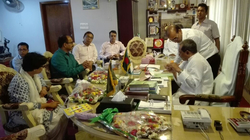
Nagpur Municipal Corporation signs an MoU with ICLEI South Asia for implementation of the Urban-LEDS II Project
July 25, 2018
Indonesian cities call for multi-level governance in addressing climate change
September 13, 2018ICLEI South Asia is implementing the Urban-LEDS II project in India and Bangladesh, in partnership with UN-HABITAT. Several cities in Bangladesh expressed their interest in implementing the project, which will be implemented over a 48 month period, starting April 2017.

Meetings were held in the month of May with national government representatives and city Mayors and officials in Bangladesh, to finalise the project cities and initiate project activities. Based on the Expressions of Interest from cities in Bangladesh, and subsequent discussions, Narayan Ganj and Rajshahi are implementing the project as pilot cities, while Sirajganj and Singra are participating in the project as satellite cities. Nagpur and Thane cities signed up for the project in India.
The project was introduced to senior officials from the Ministry of Environment, Forest and Climate Change (MoEFCC), the Planning Commission and the Local Government Division (LGD). The project was also introduced to other international partners such as Deutsche Gesellschaft für Internationale Zusammenarbeit (GIZ), the International Centre for Climate Change and Development (ICCCAD) – a research and academic organization at International University of Bangladesh (IUB).
A Project Advisory Group will be constituted at the national level, both in India and in Bangladesh to steer project implementation, with representation from other international partners.
Mayor Dr. Salina Hayat Ivy of Narayanganj City and Mayor Md. Mosaddik Hossen Bulbul of Rajshahi City expressed their keen interest in participating in the project. Reducing transport emissions, enhancing building energy efficiency and improving solid waste management were some of the stated ambitions and the Cities are keen to assess and implement related project. The scope for peer learning from other cities in Europe, as offered by the project, was lauded as an opportunity to witness best practices and subsequently accelerate local implementation. Knowledge exchange among project cities in Lao PDR, Rwanda, Colombia, India and Bangladesh was also seen as a unique opportunity of learning.
The Urban-LEDS project will support a total of 6 cities in India and Bangladesh in accelerating the implementation of Low Emission Development Strategies. Project cities will receive training and assistance for the development of Low Emission Development Strategies, which will also include climate resilience considerations. Vertical integration – across national, sub-national and city governments – of plans, policies and actions is a significant component of this project. As per guidance from the MoEFCC, Bangladesh, dovetailing local action with the provisions of the Bangladesh Climate Change Strategy and Action Plan (BCCSAP) and NDC, will be an integral part of the project.
